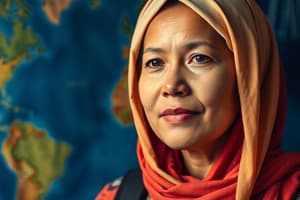Podcast
Questions and Answers
What does the term 'culture' refer to in sociology?
What does the term 'culture' refer to in sociology?
- The shared practices, values, and beliefs of a group (correct)
- The geographical location of a society
- The economic systems that govern a society
- The biological make-up of individuals in a society
Which aspect of the self is described as 'the person’s basic identity'?
Which aspect of the self is described as 'the person’s basic identity'?
- I
- Moi (correct)
- Me
- Personne
What is the first stage of self-development according to Mead?
What is the first stage of self-development according to Mead?
- Game
- Language (correct)
- Observation
- Playing
According to the Social Constructionist view, how should the self be understood?
According to the Social Constructionist view, how should the self be understood?
Which concept explains how individuals internalize the views of others?
Which concept explains how individuals internalize the views of others?
What does Vygotsky suggest about how children develop their identity?
What does Vygotsky suggest about how children develop their identity?
Which term refers to the reciprocal obligations and indebtedness in social relationships?
Which term refers to the reciprocal obligations and indebtedness in social relationships?
What does the term 'kapwa' emphasize in sociological terms?
What does the term 'kapwa' emphasize in sociological terms?
Flashcards are hidden until you start studying
Study Notes
Sociology and Society
- Sociology is the scientific study of group interactions across varying scales, from small personal groups to large societies.
- A society consists of individuals in a defined geographic area who interact and share a common culture.
- Culture encompasses shared practices, values, beliefs, and the overall way of life within a group, including social rules.
The Self and Social Constructionism
- The self is characterized as separate, self-contained, independent, consistent, unitary, and private.
- Social constructionism emphasizes the intertwined nature of individual identity with social context; they are not easily separable.
- The self is dynamic, continuously influenced by participation in social life and interactions.
Marcel Mauss' Concept of the Self
- Mauss identified two aspects of self:
- Moi: Represents an individual's basic identity.
- Personne: Represents social definitions and expectations regarding identity.
Mead's Theory of the Social Self
- Learning occurs through observing others; this forms part of self-development.
- The "Looking Glass Self" concept suggests self-perception is shaped by internalizing others' views.
- Self-development follows three stages:
- Language: Essential for self-expression and comprehension.
- Play: Involves role-playing and embodying the perspectives of others.
- Game: Integrates awareness of societal rules into self-concept.
Active Process of Self
- Mead proposes that self-identity is an active process influenced by social interactions, not merely a reflection of society.
- Distinction between "I" (self-perception) and "Me" (how others perceive us).
Vygotsky's View on Self-Development
- Emphasizes the role of real-life dialogues in shaping a child's internalization of identity through interactions with caregivers and peers.
Core Values of Kapwa
- Ibang-tao: Recognition of others as separate individuals.
- Hindi ibang tao: Acknowledgment of close relationships and shared identity.
Additional Cultural Concepts
- Kapwa: The essence of shared identity.
- Hiya: Represents shame or social awareness.
- Utang na loob: Emphasizes reciprocity and indebtedness.
- Pakikisama and Pakikipagkapwa: Reflects smooth interpersonal relationships.
- Bahala na: Expresses a sense of fatalistic passiveness.
- Lakas ng loob: Signifies courage.
- Pakikibaka: Refers to active struggle or confrontations in social contexts.
Studying That Suits You
Use AI to generate personalized quizzes and flashcards to suit your learning preferences.




